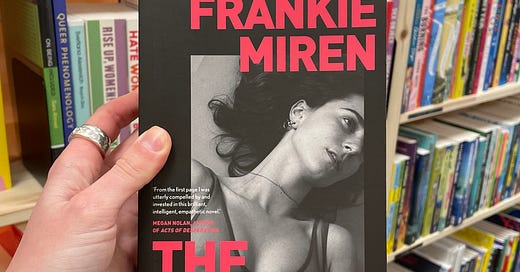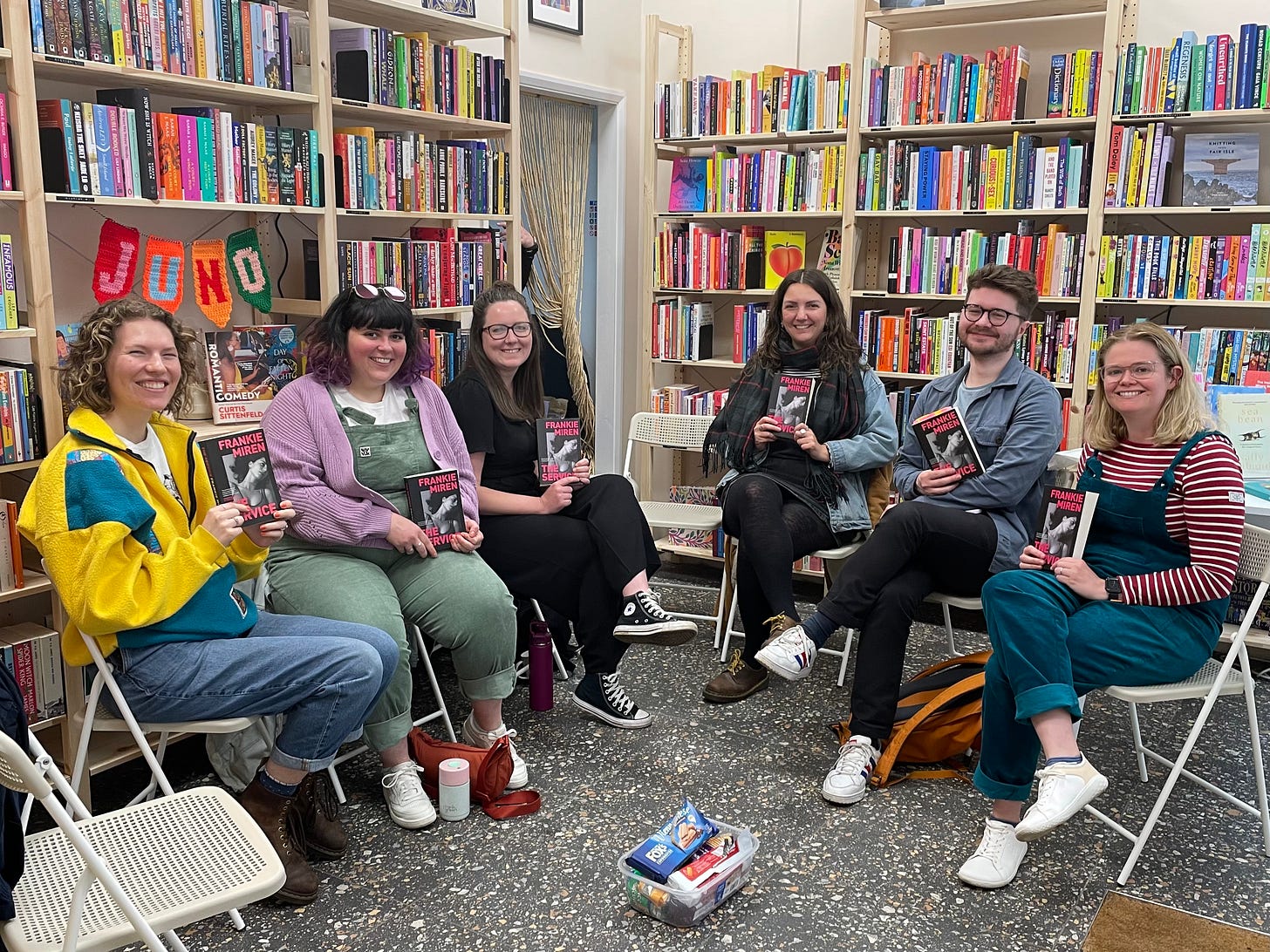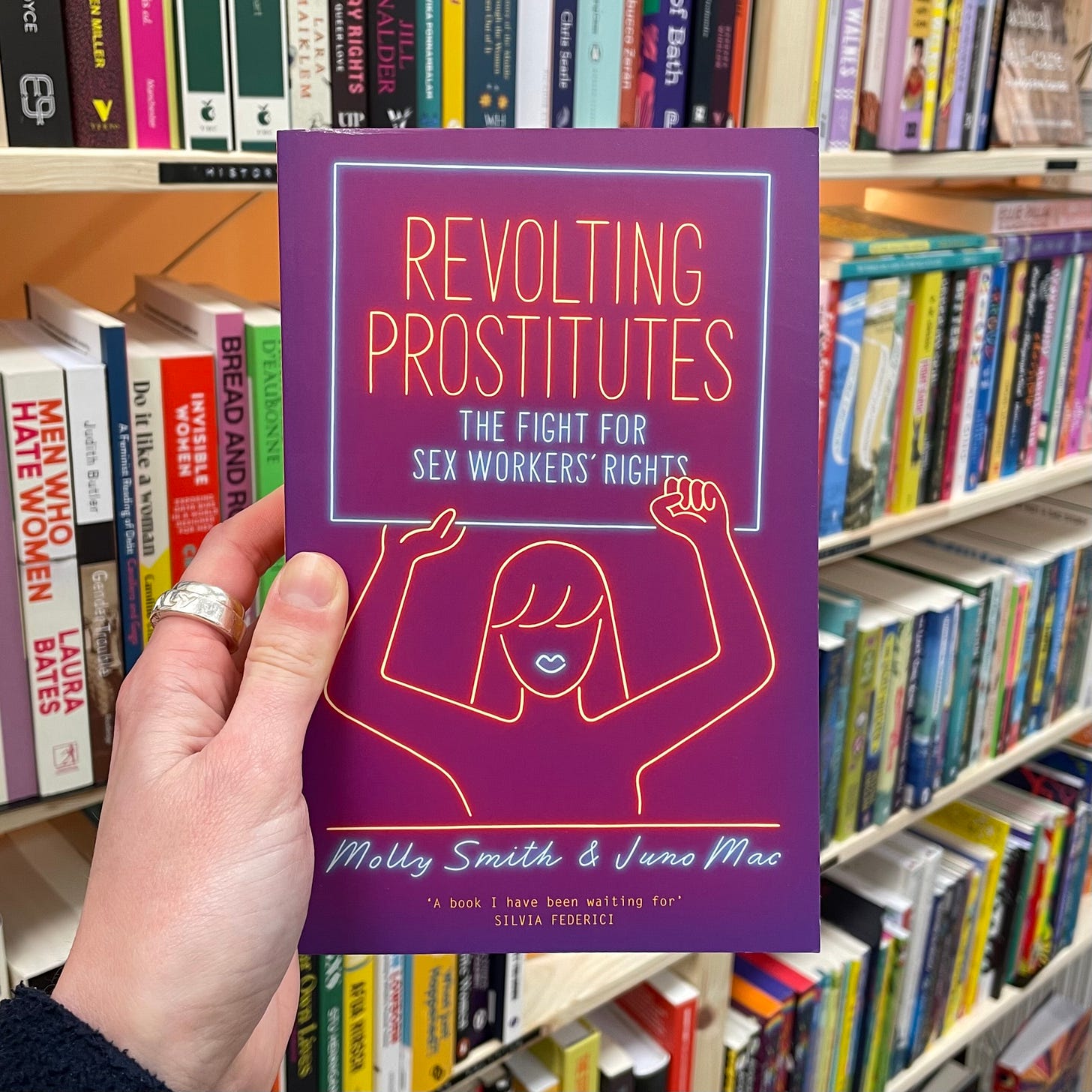Sex work, saviour complexes and steamy church scenes
We read The Service by Frankie Miren and had A LOT to say about it
One of our members suggested we think about sex work for our April book club. It’s always lovely to have suggestions of topics everyone is really keen to discuss so, with the help of some book recommendations from Juno Books and an Instagram poll to pick our favourite, we settled on The Service by Frankie Miren.
The Service is a novel told from the perspective of three women involved, in some way or another, with commercial sex. Lori sells sex from a rented flat she shares with other sex workers and saves money to fulfil her dream of moving to the coast with her young daughter. Freya is a student, whose mental ill health makes holding down an office job difficult; working as an escort is more accessible for her, and makes her a lot more money. Paula is a journalist who has made a career of reporting on anti-prostitution campaigns, including attending police raids on sex workers’ premises and, currently, investigating sex robots. As society becomes increasingly hostile towards sex workers, what will happen to these women?
Biscuits out and tea brewing we were ready to get into the good stuff…
‘She’s a complicated character’
We had a LOT of opinions about one of the three central characters, Paula. I’d suspected this might be the case so I tried to guide the conversation towards some other topics first, but to be honest, there was no fighting it - we needed to let loose.
She’s a complicated character, Paula. Beginning the novel knowing that she was adamantly anti-sex work prepared me to disagree with this woman on basically everything discussed throughout the book. I expected to have absolutely zero sympathy for her point of view, and viewed her, perhaps over simplistically, as the prototypical villain. But she was actually a lot more than that. Don’t get me wrong, ultimately she’s not the kind of gal I’d see myself hanging out with, but I do believe she had an important story to tell. We found Paula’s family dynamic particularly interesting. We discussed her relationship with her parents, her family home in the present, where her needs are consistently not met by her husband and children, as well as the arguably abusive relationship she forms with Carmen.
We had a bit of hope for Paula. The general consensus of the group was an expectation that she might have a bit of a redemption arc, learning by the end of the book that to address patriarchy and challenge sexism for all women, she needs to work with sex workers, not against them. Maybe that was wishful thinking? We talked about how, if anything, the ending of the book actually bolstered her saviour complex. While it might be undeniably positive that Paula adjusts the truth of the events that led up to Luke’s death in order to protect Lori, we didn’t believe this fundamentally shifted her perception of sex work and sex workers. Despite her astute observation of how the law would treat Lori, were they both to tell the truth, and her misidentification as a sex worker and subsequent arrest, Paula still doesn’t seem to *get it*. Ultimately, has she learnt anything?
‘Maybe that’s just peak Freya behaviour?’
We found a moment of light amongst the heavy discussion in a pivotal moment in Freya and Claire’s relationship: when they have sex in the church at the end of the book. When does this happen, and where? At the same time Lori is kicking Luke down the stairs? While Paula is hiding and overheating under a blanket? There has to be two balconies, right? Surely that’s the only way this makes sense. We all thought it felt pretty random, given everything else that was kicking off around the same time. But maybe that’s just peak Freya behaviour? Her comparative privilege was something we talked about a lot. We felt that Freya was often on her own adventure whilst quite serious events were taking place around her, like when she turned up at the sex worker activism meeting ready to get drunk and party whilst others shared stories about their precarious financial circumstances.
‘She spots the fox poised under a street light before it slips over a wall. We have an affinity now, she thinks. Night menaces, pests, vermin.’
The Service by Frankie Miren, p. 15
That said, we recognised that Freya brought something incredibly important to the novel. If we took Lori to be a closer representation to the stereotypical assumption of sex work, then Freya represented the perhaps more challenging concept of the sex worker who doesn’t have to do sex work but chooses this route as the best way for her to make money. We considered that sex work feels like something more of a choice for Freya, compared with Lori. Freya is certainly more privileged but nonetheless is an important character in showing the nuances of the commercial sex industry. We were particularly interested in the scene when Freya first visits Lori’s flat and is surprised at how tidy it is, highlighting an internalised prejudice Freya holds against someone working in the same industry as herself. Overall, we agreed that it was essential that the novel was formed from three very different characters’ perspectives.
Revolting Prostitutes
In addition to The Service, some of us also read Revolting Prostitutes by Molly Smith and Juno Mac as extra reading. This non-fiction resource acted as the perfect accompaniment to our April book, expanding the discussion on the criminalisation of sex work that makes sex workers less safe and more at risk of abuse. For example Revolting Prostitutes gave more context of the UK laws in place that resulted in Lori being arrested for brothel keeping for sharing a work premises with other sex workers.
We discussed what order we’d recommend reading these two books in and opinions were divided. Some of us liked easing into the topic with a bit of fiction and using the non-fiction as a resource to fill in knowledge gaps, while others preferred a non-fiction introduction to the topic before diving into a good story. As a group of people who all engaged with the book from a sex workers’ rights perspective, we wondered what people with more stigmatised views of sex work would have thought. And, if we were to recommend these books to someone who didn’t agree with decriminalisation, in which order would we suggest they read them? And could these books change their minds?
Our book clubs run monthly, with a different sex education theme each month. Follow our instagram account @sex.ed.bookclub to be the first to hear about our next book club.






